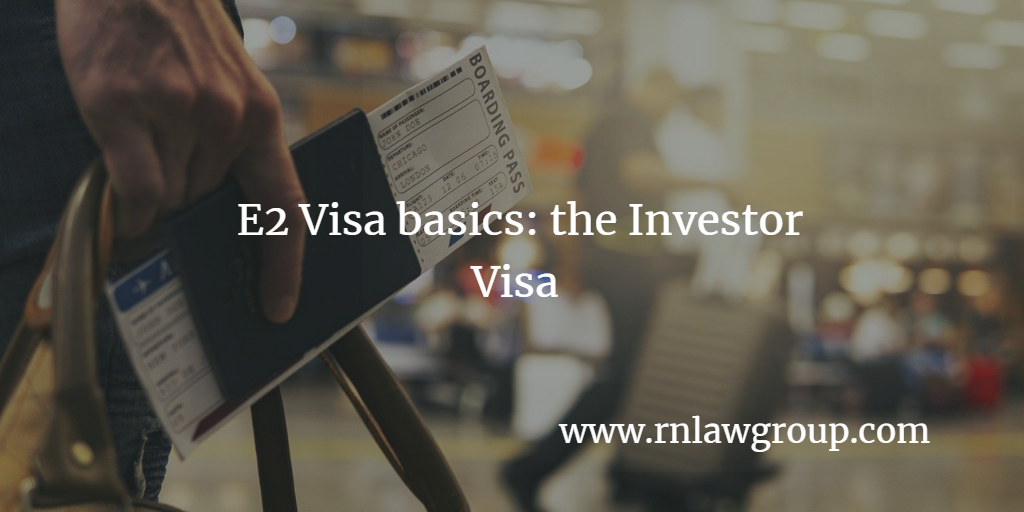
E2 Visa basics: the Investor Visa
For foreign nationals looking to start a company in the US, the E-2 nonimmigrant visa category is often times seen as one of the most popular avenues. Individuals with significant funds to invest can come to the U.S with an E-2 visa to set up a business, practice, or office, and can renew their visa indefinitely as long as the business remains viable.
The E-2 visa offers numerous advantages over other nonimmigrant visa options such as: (1) long visa validity periods, (2) no limit on the number of renewals, (3) the ability to engage in self-employment, and (4) no requirement to have a previous employment history with the employing organization, among others.
The following requirements and considerations are necessary to qualify for an E-2 Investor Visa:
(1) The individual/and or business possesses the nationality of a requisite treaty country;
Since the basis of E-2 visas were designed to enhance and facilitate economic and commercial interaction between the United States and certain countries that have signed a treaty with the US, an investor applicant must be of the same nationality as a designated treaty country. See below for a comprehensive list of treaty countries*
(2) Applicant has invested or is actively in the process of investing in a Bona Fide real and operating commercial enterprise;
The term investment means the treaty investor’s placing of capital, including funds and other assets, at risk in the commercial sense with the objective of generating a profit, and the alien must demonstrate possession and control of the capital assets, including funds invested. To be “in the process of investing” for E-2 purposes, the funds or assets to be invested must be committed to the investment, and the commitment must be real and irrevocable. That is to say, the enterprise must be close to the start of actual business operations, not simply in the stage of signing contracts (which may be broken) or scouting for suitable locations and property.
Mere intent to invest, or possession of uncommitted funds in a bank account, or even prospective investment arrangements requiring no present commitment, will not suffice. The investment capital, must have crossed the threshold of being at risk to a partial or total loss if fortunes reverse. For example, a foreign dental practice entrepreneur who has invested extensively in procuring actual office space, dental equipment, machines, marketing etc. for a regional dental practice, would stand a much higher chance of being granted an E-2 visa, than a self-styled social media influencer who says they want to start a kind of celebrity entertainment service and buys them self a Porsche as an investment. The underlying goal of the treaty investor visa is to create jobs for U.S. workers.
(3) Applicant’s investment is substantial;
The purpose of the requirement is to ensure to a reasonable extent that the business invested in is not speculative but is, or soon will be, a successful enterprise. The rules regarding the amount of funds committed to the commercial enterprise and the character of the funds, primarily personal or loans based on personal collateral, are intended to weed out risky undertakings and to ensure that the investor is unquestionably committed to the success of the business. There is no set dollar figure that constitutes a minimum amount of investment to be considered “substantial” for E-2 visa purposes. Many officers will use a proportionality test depending on the type of business, for example, while a manufacturing business might cost millions of dollars, the cost of purchasing or establishing a consulting firm might be relatively low.
(6) Investment is more than a marginal one solely for earning a living;
Any investment must not be viewed as marginal, meaning that it must have a good chance of generating sufficient income to provide for the visa holder and any family within five years of entering the U.S.
(7) Applicant is in a position to “develop and direct” the enterprise;
In all treaty investor cases, it must be shown that nationals of a treaty country own at least 50 percent of an enterprise. It must also be shown, that a national (or nationals) of the treaty country, through ownership or by other means, develops and directs the activities of the enterprise. The type of enterprise being sought will determine how this requirement is applied.
(8) The applicant must be either the owner or a key employee (executive or supervisor, or someone with essential skills) of the U.S. business;
The E-2 visa may extend to other personnel if they will occupy supervisory or executive positions or are essential to the running of the business. Supervisory or executive positions must hold a principal and primary function and not an incidental or collateral function. For example, if the position principally requires management skills or entails key supervisory responsibilities for a large portion of a firm’s operations and only incidentally involves routine substantive staff work, an E classification would generally be appropriate.
For employees who have special qualifications that make the service to be rendered essential to the efficient operation of the enterprise, the employee must, therefore, possess specialized skills and, similarly, such skills must be needed by the enterprise, either for long term needs, such as continuous development of product improvement, or quality control; or short term needs, such as start-up operations, or training and supervision of technicians employed in manufacturing, maintenance and repair functions.
(9) Applicant intends to depart the United States when the E-2 status terminates.
Although the E-2 visa requires that aliens show an intent to someday return to their home country when their US business is completed, one of the significant advantages is the ability to extend the E-2 visa indefinitely or for as long as the business concerned is in operation, and the individual is not required to maintain a foreign residence abroad.
Current Treaty Countries:
- Albania
- Argentina
- Armenia
- Australia
- Austria
- Azerbaijan
- Bahrain
- Bangladesh
- Belgium
- Bolivia
- Bosnia and Herzegovina
- Bulgaria
- Cameroon
- Canada
- Chile
- China (Taiwan)
- Colombia
- Congo
- Costa Rica
- Croatia
- Czech Republic
- Denmark (excluding Greenland)
- Ecuador
- Egypt
- Estonia
- Ethiopia
- Finland
- France
- Georgia
- Germany
- Grenada
- Honduras
- Iran
- Ireland
- Italy
- Jamaica
- Japan
- Jordan
- Kazakhstan
- South Korea
- Kosovo
- Kyrgyzstan
- Latvia
- Liberia
- Lithuania
- Luxembourg
- Macedonia
- Mexico
- Moldova
- Mongolia
- Montenegro
- Morocco
- Netherlands
- Norway
- Oman
- Pakistan
- Panama
- Paraguay
- Philippines
- Poland
- Romania
- Serbia
- Senegal
- Singapore Slovak Republic
- Slovenia
- Spain
- Sri Lanka
- Suriname
- Sweden
- Switzerland
- Thailand
- Togo
- Trinidad & Tobago
- Tunisia
- Turkey
- Ukraine
- United Kingdom
- Ygoslavia
By: James Gipson, Staff Attorney
James is a Staff Attorney at Reddy & Neumann. He works on all aspects of employment-based immigration, including non-immigrant and immigrant visa matters. Before joining the firm, James worked as an accomplished immigration litigator for a high-volume boutique immigration law firm in Miami handling a wide spectrum of immigration cases. James has successfully litigated and won numerous complex cases in the Immigration Courts and the Board of Immigration Appeals, and has written extensively before the Federal Circuit Courts of Appeals throughout the United States.
James also worked as a Federal Asylum Officer with USCIS, where he adjudicated voluminous complex cases and gained insight into the agency’s systems and processes.

